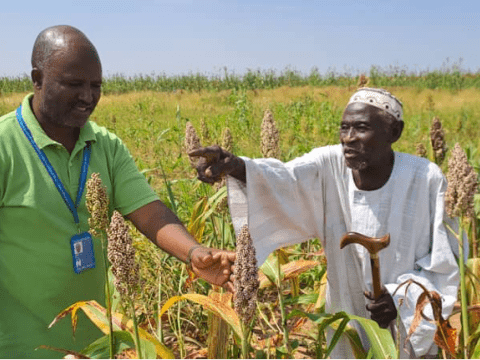Transforming Lives Through Improved Agriculture

Murta Community, situated in Kadugli, Sudan, benefited from the Food For Assets Program (FFA) by the World Food Programme (WFP) and World Vision during the 2022 growing season. This region faces semi-arid conditions with a hot, dry climate for most of the year and limited rainfall, challenging agricultural activities and exacerbating food insecurity for families relying on farming.
With subsistence farming as the primary focus due to limited fertile land and water resources, Murta cultivates staple crops such as sorghum, millet, and groundnuts. However, adverse weather conditions result in low agricultural productivity, impacting households' food sources and livelihoods. As part of the WFP funded food assistance program, Improved Crop Production Training aimed to enhance farmers' yields by introducing improved crops.
The goal was to alleviate hunger among vulnerable participants. Implementing modern farming techniques and resilient crops has become a beacon of hope for households in Murta. These methods not only ensure a more reliable food source but also create surpluses for storage or sale, enhancing food security and generating additional income for families. By adopting these improved agricultural practices, communities like Murta can combat food insecurity, build resilience against adverse weather, and bolster economic stability for farming households.
Tawor, an 83-year-old sole breadwinner, lives with his two daughters in Murta. The family owns a small piece of land from which they normally harvest around one to two bags of sorghum. "Our struggle with limited rainfall made food scarce, impacting our lives," says Tawor, sharing the community's plight.
Tawor was enrolled into the 2022/2023 food for assets program and benefited from the Crop Production Training, in which he received some improved sorghum and groundnut seeds. Despite initial doubts from his children, Tawor planted the seeds, resulting in a harvest of four bags of sorghum—double the yield he would get from traditional farming methods.
"I am grateful for the knowledge I gained from the training and very happy to have been part of the people that benefited from this improved variety; my household is now secure," says Tawor.
Tawor’s success story extends to 6,000 other households participating in crop production training across 13 localities. Among them, 953 households, including Tawor's, experienced the transformative power of improved agriculture, providing hope and sustenance for communities in Murta.